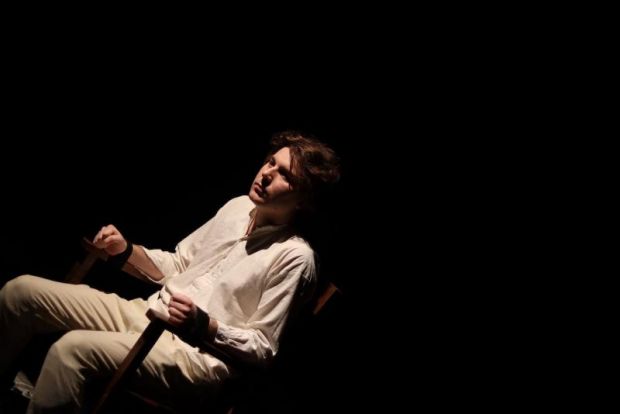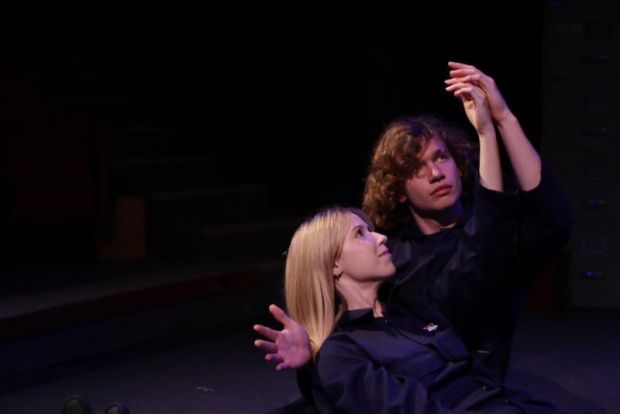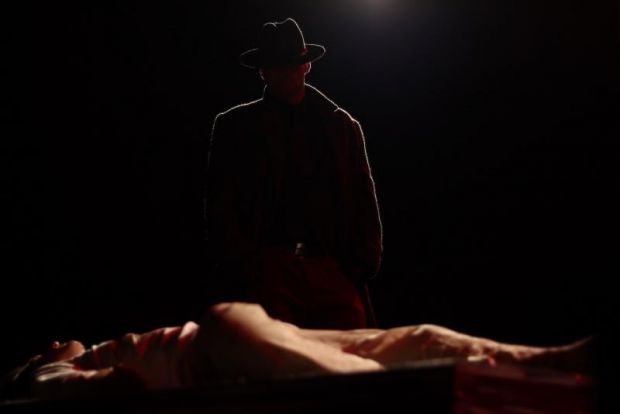Nineteen Eighty-Four
TGSS, created in 2017, describes itself as ‘experimental and progressive theatre at the University of Adelaide.’ Offered as an opportunity for students studying at Adelaide University, they operate under the auspices of the University of Adelaide Theatre Guild, affectionately referred to as The Guild. Well known and well regarded for presenting mainstream theatre that is often challenging or ‘cutting edge’ in Adelaide, The Guild has been the training ground of many of Adelaide’s actors, directors and technical teams. Whilst Adelaide University is well respected for its courses in Music and Musical Theatre at Elder Conservatorium, it is not the University in Adelaide that comes to mind for studying Drama and Performance, so TGSS is a notable opportunity for young actors studying other fields.
Nineteen Eighty-Four, George Orwell’s iconic novel published in 1949, is the story of Winston Smith, questioning the system in Oceania that keeps this futuristic, dystopian society afloat and the chaos that quickly ensues once he gives in to his natural curiosity and desire to be free. Smith, played confidently by Liam Warmeant, is caught, struggling for scraps of love from Julia (who we never meet) and freedom, in a world awash with distrust and violence.

We meet Smith atop an electrified prison platform. With the brutal 'help' of four Party Members, he is forced to confess his ‘Thought Crimes.’ Unseen is a brutal Interrogator played by Adam Bullmore who looks and acts every part a military man (coincidentally, he had over a decade with the Royal Australian Infantry Regiment.) Bullmore struts the parapets of the theatre, unseen, but often heard interjecting and goading until he finally takes over the torture. Done by running ever-increasing electric current through Smith’s body he purports to cure his mental derangement. What is chilling is Bullmore; vocally strong and resplendent and powerful in his costume that included the ‘leave no traces’ black leather gloves, it is obvious that it is he who is mentally unstable. It is a fine piece of well-paced and planted acting.
Physically and mentally under the omnipresent eye of Big Brother, themes and motifs such as censorship, freedom, and propaganda are prevalent throughout the novel and explored through the suspense of Big Brother's control and motives. Orwell's use of language defines what it means to be a citizen of Oceania and its threats to individuality and freedom. Those who criticise the book as being full of unbelievable melodrama acknowledge that whilst it is wordy, as is the play, that many expressions including ‘Big Brother’ and ‘Thought Police’, from this novel; have become part of our everyday language. Released hot on the heels of Nazi Germany and Stalin taking power in Russia, Orwell, long regarded as a predictive visionary, famously said, ‘who controls the past controls the future: who controls the present controls the past,’ and this resonates still some 70 years later.

The four party members, garbed in dark, identical overalls, work with passion, and I cannot believe their commitment to learning this complex, intricate play for such a short season (so get in fast if you are an Orwell fan). Congratulations to Jehosheba Manda for minimalist, evocative costuming for all characters. Lighting by Flynn Turley puzzles me somewhat as some is well used but the desired effect of other lighting effects used is not clear to me. One of my concerns is the lack of clarity and audibility of sound, particularly that used as Big Bother’s messages and directives which needs to be clear and chilling so I was unable fully appreciate Charlie Milne’s work as ‘The Voice.’ TGSS is also, I assume, a learning space for aspiring and developing actors, and, I believe this fine cast would benefit from vocal coaching in how to work vocally in the unique Little Theatre’s three quarter round space where, as in this play, lots of dialogue is not delivered ‘front on’. With several of the cast, their delivery often becomes conversational and lacks the necessary projection and clarity.
Henry Chipperfield and Veronika Wlodarczyk play two Big Brother devotees, who unintentionally fall in love. Both show strong passion and work well with Movement Director, Deli Cooper’s clever choreography. Their miming of being handcuffed and arrested by invisible guards is a credit to them and Cooper. Lily Watkins as Party Member 4, uses one of the four sets of stairs for a beautiful vignette where she sings and pegs out imaginary washing. As an interrogator, I feel that Watkins could become more menacing by cultivating a strong, upright physical stance. As Party Member 3, Rajiv Paranavithana, displays the potential to use his voice and physical presence well. His discipline, in character, makes him powerful and threatening. Orwell is often criticised for his inability to portray love. As with the book, showing love in this play, despite the Director, Oswin Kwan, employing different strategies to portray closeness, presents a challenge for the actors. Loving and being in love, is written somewhat superficially and simplistically.

Very reasonably priced, this adaptation of Orwell’s novel by Michael Gene Sullivan, with the combining of some of Orwell’s characters, is true to his vision. At two and a half hours, including a short interval, the play could be shortened, but if you are a fan of this classic story, all of the elements are there, and well presented.
Jude Hines
Subscribe to our E-Newsletter, buy our latest print edition or find a Performing Arts book at Book Nook.
